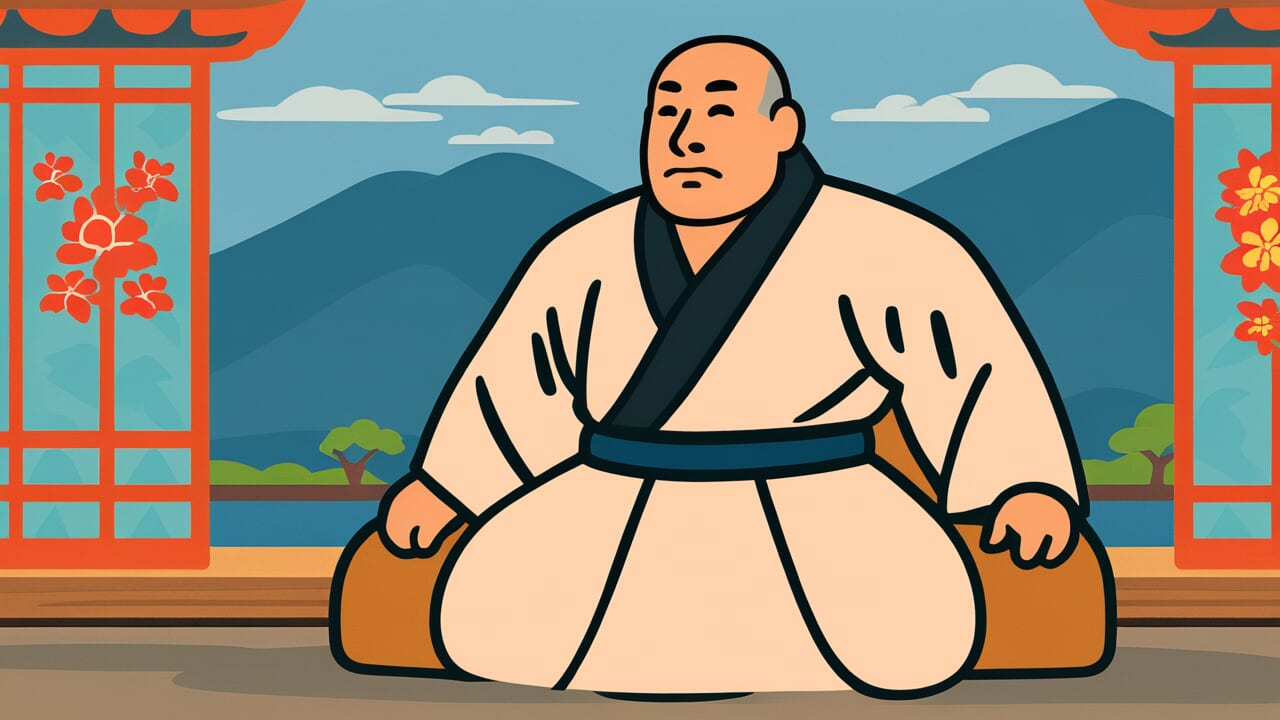How to Read “A big man’s palace”
Ōotoko no tono
Meaning of “A big man’s palace”
“A big man’s palace” means that a man with a large build has an intimidating presence. He naturally gives off an air of dignity, like someone of high status.
This has nothing to do with actual rank or ability. The proverb simply describes the strong impression that physical size creates.
This saying often applies to first meetings or public appearances. A large person can change the atmosphere just by entering a room.
Even without speaking, they command attention and presence.
Even today, physical size carries visual impact. In presentations or negotiations, bigger people naturally draw more attention.
Many of us have witnessed this phenomenon firsthand. This proverb honestly acknowledges how much appearance affects first impressions.
Origin and Etymology
No clear written records explain the origin of “A big man’s palace.” However, we can make interesting observations from how the phrase is constructed.
The word “tono” (palace) originally referred to grand buildings and mansions. Over time, it came to mean the noble people who lived there.
In samurai society, “tono” specifically indicated a lord or high-ranking person. It wasn’t just a polite title—it described someone with real power and status.
This proverb likely emerged from the relationship between physique and authority in samurai society. From the Warring States period through the Edo period, many military commanders had impressive builds.
Their imposing physiques naturally conveyed dignity and power. Success on the battlefield required physical strength, so large warriors were easily recognized as capable leaders.
However, this proverb points to something different. It’s not about actual rank or ability, but about the impression created by appearance.
A large man standing there simply looks like a “tono”—he radiates dignity and authority. Our ancestors keenly observed this visual effect and preserved it in words.
This proverb captures how physical appearance—specifically body size—powerfully shapes the impressions we form of others.
Usage Examples
- The new employee is “A big man’s palace”—he has no achievements yet, but somehow commands presence in the conference room
- When that tall, well-built man just stood there, it was truly “A big man’s palace”—everyone around him fell silent
Universal Wisdom
“A big man’s palace” teaches us a universal truth. It shows how strongly visual information influences human judgment.
We think we make rational decisions. But actually, we’re heavily swayed by what we see.
Physical size suggesting dignity and authority probably comes from instincts developed through human evolution. Large beings represented both threats and reliable protectors.
This instinct hasn’t disappeared in modern society. It continues influencing our unconscious judgments.
What’s interesting is that this proverb doesn’t simply say “big men are strong.” By using the word “tono” (palace/lord), it speaks about social status and dignity—more complex impressions than mere physical strength.
Our ancestors understood something profound. They saw that physique affects human psychology beyond simple fear. It can inspire respect and even reverence.
This proverb has endured because it touches on an eternal human theme. The gap between appearance and reality never goes away.
The impression created by looks doesn’t always match actual ability or character. Yet people remain influenced by appearance, even knowing this disconnect.
This proverb expresses this human trait honestly and with a touch of humor.
When AI Hears This
Large objects fall more easily—this relates to center of gravity height and rotational momentum. Compare a 180cm tall person with a 120cm child.
When both tilt at the same angle, the taller person’s center of gravity moves much farther horizontally. Even slight tilting can push them past the “point of no return.”
The energy calculation for falling is even more interesting. For an object to topple, its center of gravity must rise above the pivot point.
An 80kg person who is 180cm tall has their center of gravity about 100cm from the ground. Tilting 10 degrees raises it about 1.5cm, requiring roughly 12 joules of energy.
Meanwhile, a 40kg child who is 120cm tall rises only 0.4cm at the same angle. This requires just 1.6 joules.
The larger person needs over seven times more energy to prevent falling.
This relates to why dinosaurs evolved from two legs to four. As bodies grow massive, impact from falling increases with the square of body weight.
For large animals, “anti-fall design” becomes crucial for survival. High-rise buildings require seismic dampers for exactly the same physical reason.
Lessons for Today
This proverb teaches modern people to properly understand the power of appearance. This lesson has two sides.
First, it warns us when evaluating others. Don’t let first impressions from physique or appearance drag you along.
Make the effort to see a person’s true nature. Large people don’t necessarily have leadership skills. Small people aren’t necessarily less capable.
Relying too much on obvious visual information makes us overlook what truly matters.
Second, it’s about how we present ourselves. We can’t change our build, but posture and behavior greatly affect impressions.
Rather than denying appearance’s influence, understand it. Then create your own authentic presence.
This proverb quietly speaks to us. It acknowledges the reality of appearance’s impact while teaching us not to be controlled by it.
We should value both appearance and inner qualities. Let’s build balanced human relationships that honor both aspects.



Comments